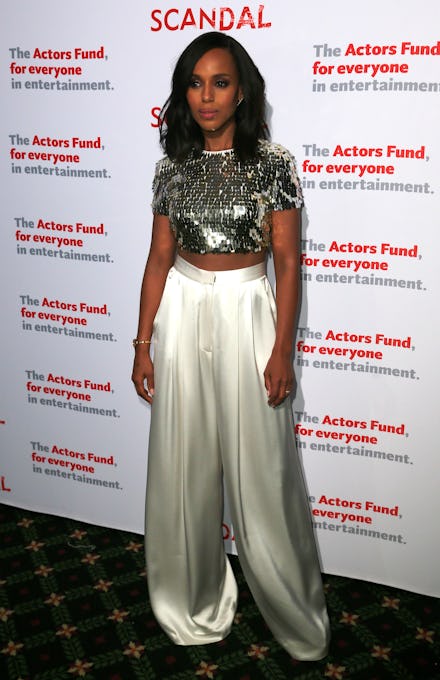‘Scandal’ was once appointment television — and its legacy will live on forever

Oh, that is tonight.
On Thursday night, Scandal, the longtime television behemoth, ended its seven-season run on ABC. Although I never stopped watching the series, it was no longer appointment television for me.
What was once new, shiny and incredibly captivating had been weighed down by time, storylines so ridiculous that it made for a frustrating watch. (Olivia Pope being kidnapped, anyone?) Our new reality under the reality star president — whose administration manages to churn a degree of salaciousness (at maximum volume, no less) — was something no scripted series could ever match.
However, as the hours drew closer to the finale, I realized that I needed to be present for the show and present in the manner which largely drove its dominance and cultural impact: live-tweeting.
I owed Olivia Pope this. I owed her Gladiators this. I owed my favorite moonshine-drinking Mellie Grant this. I owed all of them, but most of all, I owed Kerry Washington and Shonda Rhimes this.
Social media moves so fast — again, especially in the era of that man in the White House I prefer to only refer to as Sweet Potato Saddam — that it’s easy to forget that not that long ago, time stood still for many of us on Thursday nights. In the BuzzFeed piece “In creating ‘Scandal’ and Olivia Pope, Shonda Rhimes changed the TV landscape,” Rhimes recalls how in spite of creating the monstrous television hit in Grey’s Anatomy, the network was wary to put its full support behind Scandal.
“As somebody who had made a gigantic hit for a network, a hit that 14 seasons later, it is still a hit, to be given only seven episodes of a show that I made was a problem,” Rhimes said. “To me it spoke to a lack of faith in the idea that a black woman could be the lead of a television show. And I found that to be insulting.”
The show’s inaugural season’s ratings were so-so, but Scandal’s second season’s viewership was boosted tremendously by Washington’s novel idea to engage fans via Twitter. So fans of the show — along with Rhimes and several cast members — tweeted incessantly every Thursday, and Scandal instantly became must-see TV for several seasons.
As for the finale itself, it was, uh, acceptable, but not admirable. Fulfilling, but not necessarily satisfying. Did not make you upset, but didn’t invigorate you either. I’ll miss the show all the same.
On Thursday night’s episode, we saw Papa Pope’s disdain for incompetent, privileged white men being conveyed through a brilliant monologue by the artist formerly known as Byron Douglas III. Cyrus Beene remained a vile, sneaky, rude jackass you want to punch in the face. Huck was still a sweet sort of serial killer. Jake was a vanilla-latte-looking snack. Quinn and Charlie were the most adorable murderous couple you’ve ever seen on broadcast television. Fitz and Liv were annoying. Mellie was amazing. David Rosen was a gullible sucker to the very end. The whole show itself was essentially Days of Our Sociopaths.
With respect to the final moments of the show, it’s unclear whether or not Olivia Pope herself became president — and that was reportedly done with intention. We’ll presumably find out in five to 10 years once ABC or Netflix decides to do a reboot of the show. We all know it’s entirely plausible given the way Hollywood’s been behaving lately.
If it does indeed ever resurface in some form, riddle me this: What ever happened to Cyrus’ li’l black baby? Please advise. Inquiring minds still want to know.
But now that the series has run its course, we have to reflect on the legacy of the show’s impact on television. It should have never taken 40 years for another black woman to lead a show on network television. Finally, Washington was following in the footsteps of Diahann Carroll, who was the first black actress to star in a television series in a nonstereotypical role.
Imagine what would have happened had Washington’s brilliant idea to live-tweet the show had not been put in practice. Television is once again far more colorful, but that is largely thanks to the visions and utter brilliance of two black women. And of course, the support of black folks who typically know better and make sure the world knows that one tweet at a time.
In terms of content, the show actually got back on track around season five, but no matter how one may feel about whether or not it dragged on, its contribution is undeniable. So many shows now stand on the back of Scandal: Insecure, Queen Sugar, Atlanta and every other show that has smartly seized upon the realization that social media chatter can boost a show’s ratings and celebrate “we’re trending!” in jubilee. Washington knew she was handed a great opportunity, and instead of letting another black woman’s splendid vision for a show go to waste, she got shrewd and took control of her and the show’s destiny.
I will miss the characters, but the show was never intended to go on as long as it did. I’ll forever cherish Olivia Pope’s struts, sublime white coats, love of red wine and penchant for lip quivers — but overall, I can’t help but just feel grateful. Television is so much better because of what this show did on camera and behind it. I may have forgotten to watch Scandal a time or two, but I’ll never forget the legacy it leaves behind.